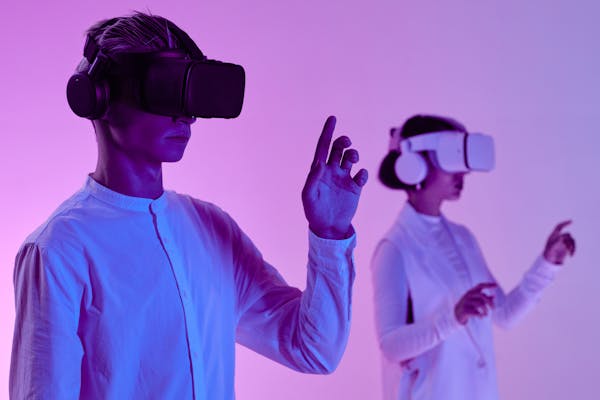
The world of virtual reality (VR) is about to take a giant leap forward with the introduction of Meta AI coming to Quest 3 VR headsets as a ‘smart mixed reality assistant’. This innovation promises to revolutionize how users interact with VR environments, blending the virtual and real worlds in unprecedented ways. As the boundaries between reality and virtuality blur, let’s explore what this cutting-edge technology entails and how it will enhance the VR experience.
A New Era of VR Interaction
The integration of Meta AI coming to Quest 3 VR headsets as a ‘smart mixed reality assistant’ marks a significant milestone in the evolution of VR technology. Unlike traditional VR, which immerses users in entirely virtual environments, mixed reality (MR) merges real-world elements with digital content. This seamless integration allows users to interact with both physical and virtual objects simultaneously, creating a more immersive and intuitive experience.
What is a Smart Mixed Reality Assistant?
A smart mixed reality assistant is an AI-powered system designed to enhance user interaction within mixed reality environments. This assistant leverages advanced artificial intelligence to understand and respond to user commands, anticipate needs, and provide real-time assistance. For the Quest 3 VR headset, this means users can expect a more responsive and personalized VR experience, with the AI assistant facilitating everything from navigation to complex task management.
Key Features of Meta AI on Quest 3
The introduction of Meta AI coming to Quest 3 VR headsets as a ‘smart mixed reality assistant’ brings a host of new features and capabilities that promise to transform the VR landscape. Here are some of the most exciting aspects:
Enhanced User Interaction
Meta AI’s integration will enable more natural and intuitive interactions within VR environments. Users can issue voice commands, gestures, and even eye movements to control their VR experience. This level of interactivity makes the VR environment more accessible and user-friendly, reducing the learning curve for new users.
Real-Time Environment Mapping
One of the standout features of the smart mixed reality assistant is its ability to map and understand the real-world environment in real-time. This capability allows the assistant to overlay digital information onto physical objects, providing contextual information and enhancing the user’s understanding of their surroundings. Imagine walking through a museum and having historical facts and interactive exhibits appear alongside the real artifacts.
Personalized Assistance
The smart mixed reality assistant is designed to learn from user behavior and preferences, offering personalized assistance tailored to individual needs. Whether you’re a gamer, a professional using VR for work, or someone exploring VR for the first time, the assistant can adapt to provide relevant information and support, making the VR experience more enjoyable and efficient.
Seamless Integration with Other Devices
Meta AI on the Quest 3 is expected to integrate seamlessly with other smart devices, creating a cohesive and interconnected ecosystem. This means you can control smart home devices, access your phone’s notifications, and even manage your schedule, all from within the VR environment. The smart mixed reality assistant serves as a central hub, streamlining your digital life.
The Impact on Gaming and Beyond
The arrival of Meta AI coming to Quest 3 VR headsets as a ‘smart mixed reality assistant’ is poised to have a profound impact on various industries, with gaming being one of the most immediate beneficiaries.
Revolutionizing Gaming Experiences
For gamers, the smart mixed reality assistant offers an unprecedented level of immersion and interactivity. Imagine playing a game where the AI assistant provides real-time tips, adjusts the difficulty level based on your performance, and even creates custom challenges tailored to your skill level. The assistant can also help manage in-game inventory, track objectives, and offer strategic advice, making gaming more engaging and dynamic.
Applications in Education and Training
Beyond gaming, the potential applications of Meta AI in education and training are vast. In educational settings, the smart mixed reality assistant can facilitate interactive lessons, virtual labs, and immersive field trips, making learning more engaging and effective. For professional training, VR simulations enhanced by Meta AI can provide realistic and safe environments for practicing skills, from medical procedures to complex engineering tasks.
Transforming Work and Productivity
The integration of Meta AI into VR headsets also has significant implications for the future of work. Remote collaboration becomes more effective with virtual meeting spaces that feel as real as physical ones. The smart mixed reality assistant can help manage tasks, organize meetings, and provide data visualizations, enhancing productivity and making remote work more efficient.
Looking Ahead: The Future of VR with Meta AI
The introduction of Meta AI coming to Quest 3 VR headsets as a ‘smart mixed reality assistant’ is just the beginning of a new era in VR technology. As AI continues to advance, we can expect even more sophisticated and intuitive interactions within virtual and mixed reality environments. The potential for innovation is limitless, from creating entirely new forms of entertainment to developing tools that enhance everyday life.
Ethical Considerations
As with any technological advancement, the integration of AI into VR also raises important ethical considerations. Privacy, data security, and the potential for AI to shape user experiences in unintended ways are all issues that need to be addressed. Developers and policymakers must work together to ensure that the deployment of AI in VR is done responsibly and transparently, prioritizing user safety and well-being.
Conclusion
The announcement of Meta AI coming to Quest 3 VR headsets as a ‘smart mixed reality assistant’ heralds a new era of VR interaction. With its ability to enhance user interaction, provide personalized assistance, and integrate seamlessly with other devices, Meta AI promises to transform the VR landscape. From revolutionizing gaming experiences to offering new possibilities in education, training, and work, the potential applications of this technology are vast and exciting. As we look to the future, the combination of AI and VR holds the promise of creating more immersive, intuitive, and impactful digital experiences.
